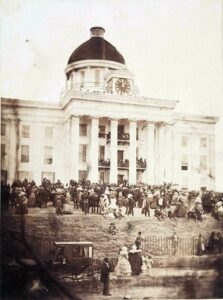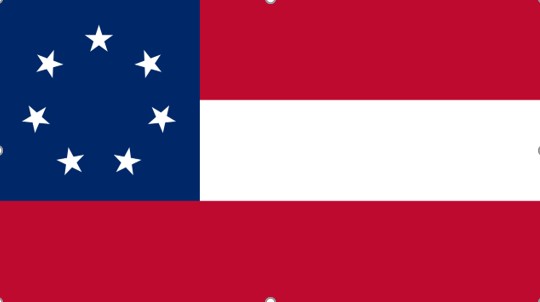The nonpartisan (constitutionalist) Provisional Confederate Congress elects Major General, Jefferson Davis, Commander of the Militia of Mississippi, as provisional President, and former Whig (nationalist) Representative Alexander Stephens, of Georgia, as provisional Vice President. Congress also adopts the “Stars and Bars” as the flag of the Confederacy, and authorizes Davis to raise 100,000 troops.
President Howell Cobb, of the provisional Confederate Congress, administers the presidential oath of office to Davis, of Mississippi, as provisional President of the Confederate States. Not once does Davis mention slavery in his inaugural address. Instead the new president speaks about the ideals of the unanimous Declaration (of Independence) and the Preambles to the Constitutions for the united and Confederate States:
Our present condition, achieved in a manner unprecedented in the history of nations, illustrates the American idea that governments rest upon the consent of the governed, and that it is the right of the people to alter or abolish governments whenever they become destructive of the ends for which they were established.
The declared purpose of the compact of Union from which we have withdrawn was “to establish justice, insure domestic tranquility, provide for the common defense, promote the general welfare, and secure the blessing of liberty to ourselves and our posterity;” and when, in the judgment of the sovereign States now composing this Confederacy, it had been perverted from the purposes for which it was ordained, and had ceased to answer the ends for which it was established, a peaceful appeal to the ballot-box declared that so far as they were concerned, the government created by that compact should cease to exist.
[updated 1/25/2025]
Subsequent Events:
Authority:
unanimous Declaration (of Independence), Paragraph 6
ccc-2point0.com/unanimous-declaration-of-independence
Provisional Confederate Constitution, Article II, Section 1 [Clause 6]
avalon.law.yale.edu/19th_century/csa_csapro.asp
References:
Bruce Catton, The Civil War, (New York: American Heritage, 1960; Boston: Houghton-Mifflin, 1987), 285.
Thomas J. DiLorenzo, Lincoln Unmasked: What you are not supposed to know about dishonest Abe, (New York: Crown-Forum, 2006), 115, 122.
Hudson Strode, Jefferson Davis, Volume I: American Patriot, (New York: Harcourt, Brace & Company, 1955), 402-03, 410.
Steven Yates, “When is Political Divorce Justified?,” Secession, State and Liberty, David Gordon, ed., (New Brunswick, New Jersey and London: Transaction, 1998), 62.
American Civil War, 1861
www.spartacus.schoolnet.co.uk/USAcivilwar2.htm
Jefferson Davis’ First Inaugural Address
jeffersondavis.rice.edu/resources.cfm?doc_id=1508


